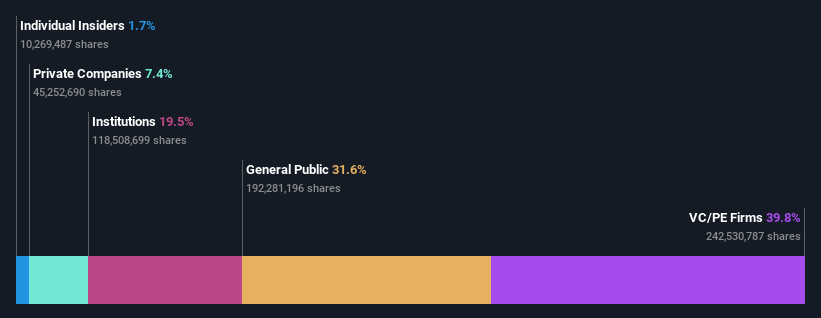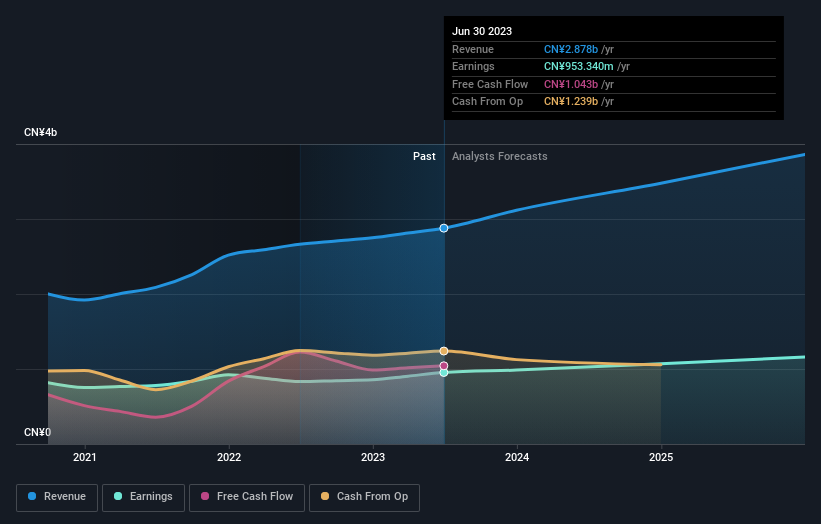Private equity firms are SciClone Pharmaceuticals (Holdings) Limited's (HKG:6600) biggest owners and were hit after market cap dropped HK$487m

Key Insights
- Significant control over SciClone Pharmaceuticals (Holdings) by private equity firms implies that the general public has more power to influence management and governance-related decisions
- The top 4 shareholders own 50% of the company
- Institutional ownership in SciClone Pharmaceuticals (Holdings) is 19%
If you want to know who really controls SciClone Pharmaceuticals (Holdings) Limited (HKG:6600), then you'll have to look at the makeup of its share registry. We can see that private equity firms own the lion's share in the company with 40% ownership. That is, the group stands to benefit the most if the stock rises (or lose the most if there is a downturn).
And following last week's 6.8% decline in share price, private equity firms suffered the most losses.
Let's delve deeper into each type of owner of SciClone Pharmaceuticals (Holdings), beginning with the chart below.
View our latest analysis for SciClone Pharmaceuticals (Holdings)

What Does The Institutional Ownership Tell Us About SciClone Pharmaceuticals (Holdings)?
Institutional investors commonly compare their own returns to the returns of a commonly followed index. So they generally do consider buying larger companies that are included in the relevant benchmark index.
SciClone Pharmaceuticals (Holdings) already has institutions on the share registry. Indeed, they own a respectable stake in the company. This can indicate that the company has a certain degree of credibility in the investment community. However, it is best to be wary of relying on the supposed validation that comes with institutional investors. They too, get it wrong sometimes. It is not uncommon to see a big share price drop if two large institutional investors try to sell out of a stock at the same time. So it is worth checking the past earnings trajectory of SciClone Pharmaceuticals (Holdings), (below). Of course, keep in mind that there are other factors to consider, too.

SciClone Pharmaceuticals (Holdings) is not owned by hedge funds. Looking at our data, we can see that the largest shareholder is GL Capital Group with 32% of shares outstanding. Meanwhile, the second and third largest shareholders, hold 7.8% and 5.5%, of the shares outstanding, respectively.
Our research also brought to light the fact that roughly 50% of the company is controlled by the top 4 shareholders suggesting that these owners wield significant influence on the business.
Researching institutional ownership is a good way to gauge and filter a stock's expected performance. The same can be achieved by studying analyst sentiments. There is some analyst coverage of the stock, but it could still become more well known, with time.
Insider Ownership Of SciClone Pharmaceuticals (Holdings)
The definition of company insiders can be subjective and does vary between jurisdictions. Our data reflects individual insiders, capturing board members at the very least. Management ultimately answers to the board. However, it is not uncommon for managers to be executive board members, especially if they are a founder or the CEO.
Most consider insider ownership a positive because it can indicate the board is well aligned with other shareholders. However, on some occasions too much power is concentrated within this group.
We can see that insiders own shares in SciClone Pharmaceuticals (Holdings) Limited. It has a market capitalization of just HK$6.7b, and insiders have HK$113m worth of shares, in their own names. It is good to see some investment by insiders, but it might be worth checking if those insiders have been buying.
General Public Ownership
The general public, who are usually individual investors, hold a 32% stake in SciClone Pharmaceuticals (Holdings). While this size of ownership may not be enough to sway a policy decision in their favour, they can still make a collective impact on company policies.
Private Equity Ownership
With an ownership of 40%, private equity firms are in a position to play a role in shaping corporate strategy with a focus on value creation. Sometimes we see private equity stick around for the long term, but generally speaking they have a shorter investment horizon and -- as the name suggests -- don't invest in public companies much. After some time they may look to sell and redeploy capital elsewhere.
Private Company Ownership
We can see that Private Companies own 7.4%, of the shares on issue. Private companies may be related parties. Sometimes insiders have an interest in a public company through a holding in a private company, rather than in their own capacity as an individual. While it's hard to draw any broad stroke conclusions, it is worth noting as an area for further research.
Next Steps:
While it is well worth considering the different groups that own a company, there are other factors that are even more important. Case in point: We've spotted 1 warning sign for SciClone Pharmaceuticals (Holdings) you should be aware of.
If you are like me, you may want to think about whether this company will grow or shrink. Luckily, you can check this free report showing analyst forecasts for its future.
NB: Figures in this article are calculated using data from the last twelve months, which refer to the 12-month period ending on the last date of the month the financial statement is dated. This may not be consistent with full year annual report figures.
New: Manage All Your Stock Portfolios in One Place
We've created the ultimate portfolio companion for stock investors, and it's free.
• Connect an unlimited number of Portfolios and see your total in one currency
• Be alerted to new Warning Signs or Risks via email or mobile
• Track the Fair Value of your stocks
Have feedback on this article? Concerned about the content? Get in touch with us directly. Alternatively, email editorial-team (at) simplywallst.com.
This article by Simply Wall St is general in nature. We provide commentary based on historical data and analyst forecasts only using an unbiased methodology and our articles are not intended to be financial advice. It does not constitute a recommendation to buy or sell any stock, and does not take account of your objectives, or your financial situation. We aim to bring you long-term focused analysis driven by fundamental data. Note that our analysis may not factor in the latest price-sensitive company announcements or qualitative material. Simply Wall St has no position in any stocks mentioned.
About SEHK:6600
SciClone Pharmaceuticals (Holdings)
A biopharmaceutical company, engages in the development and commercialization of pharmaceutical products in the therapeutic areas of oncology and severe infection in Mainland China and internationally.
Outstanding track record with flawless balance sheet.


